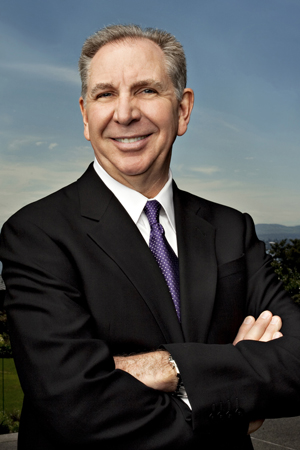
UW President Michael Young (Photo from UW)
By Zachariah Bryan
Northwest Asian Weekly
When students and members of the Asian community learned that the University of Washington (UW) was discontinuing the Southeast Asian Student Recruiter position, they were in disbelief.
“We found out very abruptly in November 2013. I was very shocked when it happened because finally Southeast Asians were getting a little more attention than before,” said Tony Vo, former Asian Student Commission Director for the Associated Students of the University of Washington. “We had a lot more goals in mind when we started this position. … Once the position was lost, we kind of took a step back. It made us all step back.”
In an attempt to reinstate the position, and air out other concerns, the Asian Counseling and Referral Services (ACRS) will be hosting a meeting with UW President Michael Young. The meeting will take place on Thursday, July 31, at 3:30 p.m., at the ACRS building, located at 3639 Martin Luther King Jr. Way South.
The recruiter position was held by Latana Thaviseth for about one year, until Jan. 10. She was charged with identifying students interested in attending the UW and set up college application workshops with them, according to the UW Daily. She was also responsible for partnering with community-based organizations assisting underprivileged Southeast Asians in the Puget Sound region. By the time she was done, she had created 16 new liaisons with local Southeast Asian organizations.
Thaviseth’s job was temporary, but it was with the ongoing assumption that the UW was looking for permanent funding, Vo said.
According to Vice Provost of Diversity Sheila Edwards Lange, the reason why her office hired a temporary intern was to help “clarify what the issues are for Southeast Asian students at UW Seattle” along with developing outreach programs for the students, finding new partnerships in the community and guiding the Office of Minority Affairs and Diversity (OMAD) on how to close the educational gap for the students.
Lange said, “We respect what we have heard from those who are committed to working with us to improve college access and success for Southeast Asian students, and there is a good chance the position will be reinstated.”
Vo said that having a Southeast Asian Student Recruiter is important if the UW has any real desire to connect with the community.
“I think someone who can relate to you and is from your community gives you trust and a belief that you can be at that institution as well and can reach higher education,” Vo said.
ACRS Executive Director and UW alumna Diane Narasaki said that many Southeast Asians are disadvantaged and need every connection to receiving a better education that they can get.
“The Asian American population is a community of contrasts which is extremely ethnically diverse. While some parts of the community have attained educational and economic success, other parts of the community have alarming educational and economic indicators,” Narasaki wrote in a press release.
The Southeast Asian communities face significant disparities, she continued. Thirty-seven percent of the Hmong community, 29 percent of the Cambodian community, 18 percent of the Laotian community, and 16 percent of the Vietnamese community live in poverty. Moreover, 40 percent of Hmong, 38 percent of Laotian, and 35 percent of Cambodian students drop out of high school.
“Like the other groups which have student recruiters employed by OMAD, these communities clearly experience poverty and all the barriers of opportunity gap. Like the other groups which have much needed student recruiters, the Southeast Asian communities require the support of a culturally competent student recruiter that comes from the relevant community,” Narasaki wrote.
Now, the duties of Southeast Asian student recruitment have been added to the responsibilities of Va’eomatoka “Toka” Valu, who heads Pacific Islander recruitment. Vo thinks lumping together two completely different communities is an inefficient answer.
“It’s taking away valuable time from a person who is very knowledgeable about the Pacific Islander community to serve a community they’re not very knowledgeable about,” he said. “[And] what if a Southeast Asian takes on the job in the future who doesn’t know about the Pacific Islander community? It’s harmful for both communities.”
Having a recruiter was just the first step in a laundry list of needs for Southeast Asians at the UW, Vo said.
He envisioned programs to help with student retention and more Asian representation in the staff and administration.
According to Lange, many of the relationships with Southeast Asian community groups were already developed by Toka before there was the temporary intern position.
“There are a number of community-based college access programs that are inclusive of all AAPI (Asian American and Pacific Islander) students…and I am sure they do not consider their work as lumping different cultures together,” Lange said.
Still, though the Southeast Asian Student Coordinator position was lost, Vo said the community reaction and the ensuing dialogue has been meaningful. The meeting this Thursday with President Young is another step in the right direction, he said.
“It has made the conversation a lot richer,” he said. “I think our voices have been heard because it’s escalated so far. I would definitely say the Asian community has mobilized around this issue and those voices are really heard.” (end)
Zachariah Bryan can be reached at info@nwasianweekly.com.



